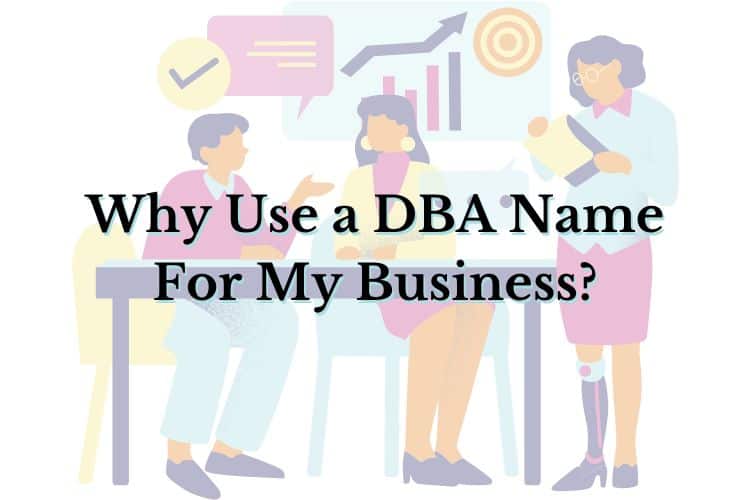
Not all businesses need DBAs. It depends on the business’s legal entity, the locale’s requirements, and the business owner’s preference.
Sole proprietorships and partnerships.
If you’re a sole proprietorship or general partnership, you must file a DBA to use a name other than your or your business partner’s full, legal name. Sole proprietorships and general partnerships are unincorporated and don’t need to file with the state. However, they do still need to acquire business licenses and permits necessary by the state or jurisdiction’s law.
This means the owners and their businesses are one and the same entity, which means they have the same name, too. This may not be suitable for certain needs for the business, as stated below.
There are several reasons a person would want to use a DBA (doing business as) name for their business. Some of these reasons include:
1. Branding: A DBA name can help a business establish a unique identity and brand that is separate from the owner’s personal name.
2. Legal compliance: Some states require businesses to register their DBA name in order to operate per local legalities.
3. Flexibility: A DBA name can allow a business to expand into different markets or product lines without having to change its legal name.
4. Privacy: Using a DBA name can help protect the owner’s personal information by keeping their name separate from the business.
5. Professionalism: A DBA name can give your business a more professional and established image to customers. This can be important for attracting customers and business partners.
What are disadvantages of a DBA vs. Sole Proprietorship?
A DBA (doing business as) is a type of legal name that a sole proprietorship can use to operate under a different name. Here are some disadvantages of using a DBA compared to a sole proprietorship:
1. Legal protection: A DBA does not offer any legal protection to the business owner. As a sole proprietor, the owner is personally responsible for all debts and legal issues that the business may face. This means that the owner’s personal assets, such as their home or car, could be at risk if the business is sued or goes bankrupt.
2. Credibility: While a DBA can give a business a unique identity and brand, it may not be as credible as a sole proprietorship. This is because a sole proprietorship is a legal entity that is recognized by the state, which can give it more legitimacy in the eyes of customers, partners, and investors.
Get The Latest Issue Of The Guiding Cents Newsletter Sent Straight To Your Inbox
Join 97,000+ getting mind knowledge every Saturday morning while reading, you’ll learn a bit about life & business too. Just click the button to go to the signup page which opens in a new tab.
3. Taxation: With a DBA, the owner is considered a sole proprietor for tax purposes, which means that they will pay self-employment taxes on all of the business’s profits. In contrast, a sole proprietorship can offer more tax benefits and flexibility, such as the ability to deduct business expenses from their personal income.
4. Limited lifespan: A DBA is typically only valid for a certain period of time, after which it must be renewed. In contrast, a sole proprietorship has a more permanent existence and can continue to operate even if the owner passes away or leaves the business.
Overall, while a DBA can be a good option for small businesses or sole proprietors who want to operate under a different name, it does not offer the same legal protection, credibility, or tax benefits as a sole proprietorship.
What are disadvantages of a DBA over an LLC?
While a DBA (doing business as) name can be a good option for some businesses, it has some disadvantages when compared to an LLC (limited liability company). Here are a few:
1. Personal liability: With a DBA, the owner is personally liable for any debts or legal issues that the business may face. This means that their personal assets, such as their home or car, could be at risk if the business is sued or goes bankrupt. In contrast, an LLC provides limited liability protection, which means the owner’s personal assets are generally protected from business debts and legal issues.
2. Credibility: While a DBA can give a business a unique identity and brand, it may not be as credible as an LLC. This is because an LLC is a legal entity that is registered with the state, which can give it more legitimacy in the eyes of customers, partners, and investors.
3. Taxation: With a DBA, the owner is considered a sole proprietor for tax purposes, which means they will pay self-employment taxes on all profits the business receives. In contrast, an LLC can choose to be taxed as a partnership or corporation, which can offer more tax benefits and flexibility.
4. Limited lifespan: A DBA is typically only valid for a certain period or time frame, after which it must be renewed. In contrast, an LLC has a more permanent existence and can continue to operate even if the owner passes away or leaves the business.
Overall, while a DBA can be a good option for small businesses or sole proprietors, an LLC may offer more legal protection, credibility, and tax benefits.
Recent Posts
Experian Boost is a free credit-building tool that can help improve your credit score. It works by allowing you to add positive payment history for bills that are not traditionally reported to credit...
In today's society, many individuals are realizing that the traditional path of going to school, getting a job, and saving for retirement may not lead to the fulfilling life they desire. They may...
